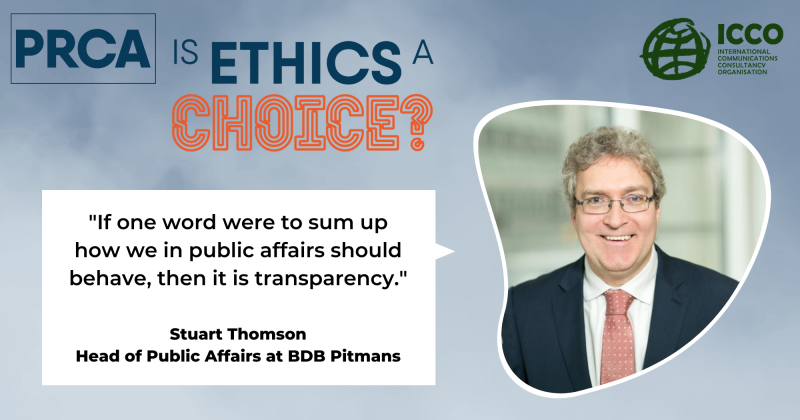
The behaviour of all those involved in public affairs needs to be of the highest standard. But knowing what those standards are and why they are important means that we all need to be vigilant, all the time.
There is no escaping the fact that there has been poor behaviour in the past. The establishment of the Association of Professional Political Consultants (APPC) in 1994 was a direct response to such poor behaviour and the media headlines generated. This self-regulatory body had its own code, of conduct, a publicly available register of clients and imposed a complete ban on any financial relationship with politicians.
But since that time, the word ‘lobbying’ has been tainted in the eyes of some. The battle to improve the reputation of the profession continues and was boosted with when the APPC merged with the PRCA to create the Public Affairs Board.
We all have a role to play in boosting that reputation as well. Poor behaviour can bring down entire companies and can end personal careers as well. But that is not just restricted to those in consultancies. The Code also applies to those working in-house as well. Poor behaviour is just as much of a consideration for them as anyone else.
Charities can see their fundraising limited. Service users may not want to use services provided. Contracts can be brought to a swift end. New contracts become unobtainable. The list of consequences is extensive.
So, the Code of Conduct, as set out by the Public Affairs Board is clear and simple both in terms of what counts as public affairs work but also what is expected of each of us. What can I not do? What are the sort of activities that I need to be careful about? I also run regular sessions on the Code as well so that participants can learn more about the Code and ask questions.
High ethical standards are expected of other professions so why not public affairs? If we are to be taken as seriously as lawyers or accountants, then standards of behaviour are part of the package. Getting a seat at the ‘top table’ of any organisation means having the trust of others. The trust must be earned. Ethical behaviour is central to that.
But we also need to think about the reaction of our key audiences if we do not maintain high standards of ethical behaviour. What politician or adviser will want to meet with individual or organisation who have shown poor behaviour? It means they will, rightly, question your judgment and, in turn, the arguments you are making. In the glare of the media, and especially social media, could they even defend engaging with you? What would mean for the electoral prospects of an MP?
But the same applies to civil servants as well. Would they be able to explain why they had met with an organisation whose behaviour can be questioned?
Whilst we need to make sure we personally adhere to the standards; we should also be helping those around us maintain those standards as well. This is not to suggest that you act as an internal police force but if you see that standards are not being maintained, maybe because the people do not really know what the code says, then help them. Doing that helps you and your organisation. We are all in it together.
We all need to help ourselves and our organisations maintain standards. If one word were to sum up how we in public affairs should behave, then it is ‘transparency’. The more you keep that in mind the less chance there is of ever going wrong.
